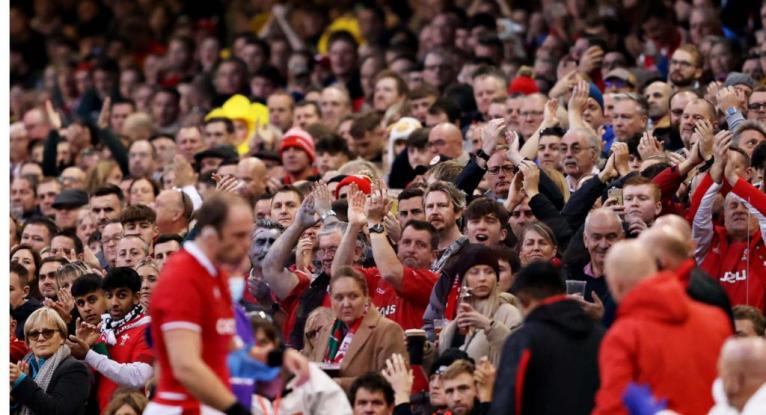I don’t think Martin Johnson ever got dropped, did he? Or Richard Hill? I think I’m right in saying they only ever stopped playing for a team when they decided to, but I can’t think of many more from my generation. The great Jason Leonard spent many matches on the bench, and even Jonny Wilkinson had to watch from a distance a few times. I do find myself wondering what will happen when Alun Wyn Jones reaches the end – probably in about 2028 – as there are a few different ways in which the end can arrive.
“They’re freezing me out here, mate,” one friend said to me. “I can feel it.” He’d been capped over 50 times for his country by this point, yet he could sense a change blowing in. The coach wouldn’t name the team until the Wednesday, but he would read out 15 names and ask them to put on yellow jerseys on the Monday morning to start practice, and from that a million split-second deductions and calculations and permutations would begin whirring around in the minds of every player not on that supposedly random list. One England coach I played under said on such a Monday morning: “Don’t read anything into it, lads, but you can if you want.” I always loved this; he knew, and he knew we knew.
These mini-announcements are at first glance rather gentle, but what they actually represent to the excluded is the result of hours of private conversations in which, your mind will quickly remind you, you have not been complimented. No, those men who hold your professional destiny in their hands have discussed you with no holds barred and decided you are inadequate. You are not what the team needs. These moments of quiet brutality hurt some players more deeply than others, of course, but regardless of what reactive cocktail might be rampaging around a player’s brain, he must remain entirely unexpressive and compliantly begin the first training drill as if nothing more significant than a cloud obscuring the sun for a second has occurred. Silent panic. Invisible despair.

Said friend was capped many more times after this apparent freezing out, but he wasn’t wrong; it just took time for them to find a replacement and for that replacement to prove his robustness. Many – including me – would remind him what an honour it was to have been capped so many times in the first place, never mind the 20-odd that followed his apparent descent into sporting no man’s land, but these things are all relative and his expectations for his career didn’t match what this one man at the top had planned for him. So it hurt, and I believe it stings him still, many years on.
I still can’t decide whether I think having a team manager do your dropping for you is a complete bottle job or if it merely displays a sociopathic lack of empathy, but either way it was astonishingly poorly done.
There are, to my mind, some infinitely more savage ways to be dropped. I was once, as a youngster, just arriving for England training very early on a Monday morning and my phone rang. We’re talking 6.30 am here, and it was the England team manager, calling to tell me I wouldn’t be needed by England and I should indeed please drive to the England A training base in Manchester. “Er, I’m already in the car park,” I said, rather pathetically, and the response was basically: “Not my problem, chief, and I’ve got a load of other lads to drop on behalf of the coach so could you please just accept it and move on? Thanks.” To said team manager (who was both brilliant and lovely, by the way) this was probably just a horrid start to the week which, frankly, she shouldn’t have had to handle, but to us lot it meant disappointing phone calls to mums and dads and girlfriends and team-mates. And it left a very sour taste indeed.
I still can’t decide whether I think having a team manager do your dropping for you is a complete bottle job or if it merely displays a sociopathic lack of empathy, but either way it was astonishingly poorly done. On the international stage, though, I was but a minnow – and generally an injured minnow at that – so I guess it was deemed acceptable to treat me like one, but what happens when a giant of the game comes to the end? The thing is, you see, every giant wilts eventually; every maestro sees his thumbs turn blunt; every megastar’s eyes one day lose their sparkle.

In an ideal world these superstars – Alun Wyn Jones being a great potential example – know so much about the game and its demands, they know when they start losing their grip on the jersey they’ve called theirs for so long, and they call it a day before anyone has to call the vet to the stables. Winning a World Cup or a Grand Slam at a ripe old age is a nice time to do it, obviously, but so few get to live out a Richie McCaw script in real life. Most check out when already on the way down, through the side door, or on crutches, as the insatiable drive and tunnel vision which got them to the top blinds them to their own degeneration.
Being dropped wounds people, or at least it should. Just like when we were kids, we just want to be involved, to be brought in and retained by popular demand, and to be regarded as irreplaceable; it’s just human nature.
Most top players will be told in person by their coach that the door has finally closed and, while that may sound like a nice opportunity to retire as if on their own terms, these super-motivated types rarely see it as such, instead deciding to try to prove this coach wrong. For some it will light – or indeed relight – a fire within, for others it will extinguish any lingering flames with a melancholic hiss. However these infinite human reactions differ, though, one thing absolute in the minds of the vast majority is the decision to leave them out is an incorrect one. Lots of players will carry this grief with them for years after the playing has stopped, if only in the smallest quantities, just near enough to the surface to make itself known should said coach enter a room, or should the player who took their place arrive on a screen or a stage to rapturous applause.
Being dropped wounds people, or at least it should. Just like when we were kids, we just want to be involved, to be brought in and retained by popular demand, and to be regarded as irreplaceable; it’s just human nature. By the time we all realise we are nothing of the sort to anybody but our families, it’s too late; the hurt has happened and the scars live within us. And all of this hangs on the opinion – and it is just an opinion – of one person. One coach. Whole legacies and whole folders full of memories in the hands of someone who owes you nothing. Never mind the collisions on Saturday afternoons, for many, those early days in the training week where 15 names were loosely shouted out by the coach as if cobbled together on the spot were the most brutal of all.



Great article as usual Flats.
Thoroughly informative and insightful
Thanks for all the insights. I always wonder how those calls are made, especially with the biggest players in the game. Fantastic article.
Love it, always a great yarn from this bloke. This is the fascinating stuff for us mere mortals who never get near representative rugby.
Brilliant article. Such a fascinating perspective.